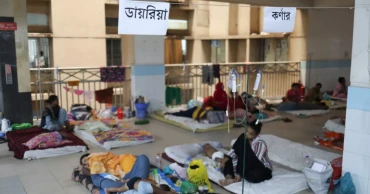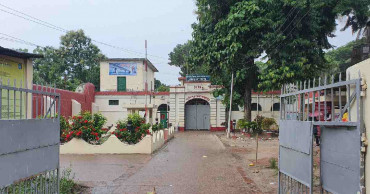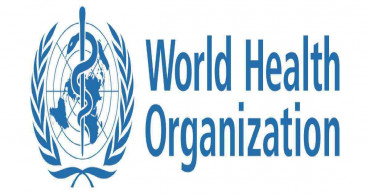medical facilities
Overwhelming heat exacerbates health challenges across Dhaka, as children bear the brunt of the impact
A prolonged heatwave has significantly increased patient admissions in hospitals throughout Dhaka, with the city's medical facilities struggling to cope with the additional burden.
Most admissions involve heatstroke, fever, cold, diarrhoea, and pneumonia, ailments that disproportionately affect children.
Patients and their families face severe heat within hospital premises as well, worsening conditions for those already suffering. Many hospitals, including Dhaka Medical College Hospital (DMCH), have reported a surge in cases since Eid, with no space left even on the floors, forcing many to resort to makeshift solutions like hand fans or small table fans.
Abul Malek, from Dhaka’s Nodda area, was admitted at DMCH. His son Nadim told UNB, "The heat is unbearable, and the lack of available beds has left my father to receive treatment on the floor. The situation would have been somewhat manageable with lower temperatures."
Severe heatwave in Khulna: Day labourers forced to work in dangerous conditions
In response to the dire situation, Brigadier General Md. Asaduzzaman, Director of Dhaka Medical College Hospital, emphasized their efforts to improve conditions. "We're swapping out all malfunctioning fans and adding new ones wherever possible. Additionally, technicians have been instructed to ensure separate lines for fans and lights to prevent electrical issues."
Patient admissions have reportedly doubled at Kurmitola General Hospital, Mugda Medical College and Hospital and Dhaka Shishu Hospital as well since Eid. The majority of these patients are suffering from diarrhoea and pneumonia. The emergency and outpatient medicine departments are under the most pressure, facing the highest patient load.
Professor Dr. Farid Ahmed, Head of General Pediatrics at Dhaka Shishu Hospital, highlighted the impact of the heatwave on young patients: "With the heat continuing, children are particularly vulnerable to heatstroke and other diseases, which have led to an alarming rate of hospital admissions. We are struggling to provide enough beds."
Public health expert and former director of Disease Control at Directorate General of Health Services, Professor Dr. Be-Nazir Ahmed, stressed the severity of the situation, noting, "The current heatwave is unbearable. It not only raises the risk of cholera but also heightens the likelihood of other diseases. Extreme temperatures disrupt normal bodily functions, posing life-threatening risks and increasing susceptibility to various infections."
Fear of fruit failure grips mango growers in Chapainawabganj as heatwave Intensifies
The authorities have urged the public to stay indoors unless absolutely necessary and avoid direct exposure to extreme temperatures. With schools reopening, there is an increased concern for children's safety, necessitating heightened awareness and preventive measures against foodborne diseases and dehydration.
This crisis underscores the pressing need for improved infrastructure and preparedness to handle climate-induced health emergencies, particularly for the most vulnerable populations such as children.
1 year ago
Inmates at overcrowded Faridpur jail suffer in absence of medical facilities
There is just one pharmacist at Faridpur district jail to serve 914 inmates, as the post of an assistant surgeon for the jail remains vacant for long, thanks to the negligence of the authorities.
There are no physicians, no diagnostic centre or any other medical facilities inside the jail.
In 1825, Faridpur district jail was established at Jhiltuli on 34 acres of land.
A corrugated tin-shed room is available at the jail for providing medical services to the jail inmates, but it remains unfit for use.
Abdullah Al Mamun, the supervisor of Faridpur Jail, said there is a capacity of 420 inmates, but it currently counts well over double that: 897 male and 17 female inmates. The post of assistant surgeon has remained vacant for a long period of time.
“If we find any prisoner sick, we used to take him/her to the Faridpur Bangabandhu Sheikh Mujib Medical College and Hospital. Besides, a physician has been appointed but he is not regular. A senior pharmacist is available to provide medical care to them,” he said.
Besides, three attendees are required with a patient when sent to the hospital outside the jail, hampering the normal activities of the jail due to the manpower crisis, said Al Mamun.
Read: Any role in artificial fertilizer crisis
Pharmacist Ashraful Alam, who is available at the jail for providing first aid, said minimum 2-3 physicians are needed for providing healthcare services to the jail inmates.
He also stressed the need for a permanent hospital for medical care of the inmates alongside 3-4 nurses and a diagnostic center.
According to the district jail sources, some 1050 jail inmates took healthcare services in the past three months and two inmates are undergoing treatment at Bangabandhu Sheikh Mujib Medical College and hospital and one died while undergoing treatment.
Many jail inmates from other jails adjacent to Faridpur district also came here to avail medical treatment.
Kabirul Islam Siddique, jail inspector of Faridpur jail, said the prison is crammed and the number of inmates well over their capacity, is a major problem.
“It is true that the inmates are suffering a lot due to the manifold crises but the authorities concerned should take measures in ensuring the medical services to the prison inmates," Siddique said.
District Magistrate Atul Sarka said a physician was attached to the jail and local administration also visited the jail regularly and inquired about the facilities of the inmates.
END/UNB/Corr/MAS/ssk/0032
3 years ago
COVID-19 continues to disrupt essential health services in 90pc of countries: WHO
The second round of a World Health Organization “pulse survey“ reveals that over one year into the COVID-19 pandemic, substantial disruptions persist, with about 90% of countries still reporting one or more disruptions to essential health services, marking no substantial global change since the first survey conducted in the summer of 2020.
Within countries, however, the magnitude and extent of disruptions has generally decreased. In 2020, countries reported that, on average, about half of essential health services were disrupted.
In the first 3 months of 2021, however, they reported progress, with just over one third of services now being disrupted, said the WHO on Friday.
This survey looks at 63 core health services across delivery platforms and health areas. It was sent to 216 countries and territories across the six WHO regions.
Also Read: 90pc of countries report disruptions to essential health during coronavirus pandemic
135 responses were received (63% response rate) from senior ministry of health officials predominantly between January and March 2021.
The responses referred to the situation in the country during the 3 months prior to survey submission (in this case predominantly covering periods between October 2020-February 2021).
Overcoming disruptions
Countries have been working to mitigate disruptions. Many have now stepped up communications efforts to inform the public about changes to service delivery and provide advice about ways to safely seek health care. They are also triaging (the practice of allocating scarce medical resources among patients) to identify and better meet the most urgent patient needs.
More than half the countries consulted say they have recruited additional staff to boost the health workforce; redirected patients to other care facilities; and switched to alternative methods to delivering care, such as providing more home-based services, multi-month prescriptions for treatments, and increasing the use of telemedicine.
Read Alert over shortage of new drugs for ‘world’s most dangerous bacteria’
In addition, WHO and its partners have been helping countries to adapt their processes so they can better respond to the challenges being placed on their health systems; strengthen primary health care, and advance universal health coverage.
“It is encouraging to see that countries are beginning to build back their essential health services, but much remains to be done,” says Dr Tedros Adhanom Ghebreyesus, Director General, WHO.
“The survey highlights the need to intensify efforts and take additional steps to close gaps and strengthen services. It will be especially important to monitor the situation in countries that were struggling to provide health services before the pandemic.“
Persisting causes of disruptions
Countries are still having to make important decisions when responding to COVID-19 that may negatively affect access to care for other health issues. Redeployment of staff to provide COVID-19 relief and temporary closures of health facilities and services continue.
Read COVID-19: Health services for noncommunicable diseases significantly impacted
Although they may have taken on new staff, 66% of countries continue to report health workforce-related reasons as the most common causes of service disruptions. Supply chains are also still disrupted in nearly one third of countries, affecting the availability of essential medicines, diagnostics, and the PPE needed to safely and effectively provide care.
Communications efforts need to be further scaled up: more than half of countries report service disruptions due to patients not seeking care and because of community mistrust and fears of becoming infected.
Meanwhile, 43% of countries cite financial challenges as major causes for disruptions in service utilization.
As a result, millions of people are still missing out on vital health care. In terms of services, the biggest impact reported by nearly half of countries is on provision of day-to-day primary care to prevent and manage some of the most common health problems.
Read Shocking imbalance in Covid vaccine distribution: WHO
Long-term care for chronic conditions, rehabilitation, and palliative end-of-life care, is also still badly disrupted - severely affecting older people and people living with disabilities.
Potentially life-saving emergency, critical and surgical care interventions are still disrupted in about 20% of countries, reflecting the most immediate indirect consequences of the pandemic.
Two thirds of countries also report disruptions in elective surgeries, with accumulating consequences as the pandemic is prolonged.
Among the most extensively affected health services (i.e. those for which more than 40% of countries are reporting disruptions) are those for mental, neurological and substance use disorders; neglected tropical diseases; tuberculosis; HIV and hepatitis B and C; cancer screening, and services for other noncommunicable diseases including hypertension and diabetes; family planning and contraception; urgent dental care; and malnutrition.
Read WHO team urges patience after 1st look for origin of virus
Issued ahead of World Immunization Week (which starts 24 April) and World Malaria Day (25 April) the survey reveals that serious gaps also remain in addressing disruptions to services in both these areas.
More than one third of countries are still reporting disruptions to immunization services, despite progress in countries reducing disruptions to immunization services in health facilities and “outreach” immunization services by about 20% and 30% respectively compared to 2020.
This highlights the need for new and sustained approaches to improving immunization coverage and uptake.
“The COVID-19 pandemic continues to pose serious challenges to global health beyond the impact of the disease itself,” said Henrietta Fore, UNICEF Executive Director.
Read WHO report says animals likely source of COVID
“For children, disruptions to immunization services have serious consequences. As we scale up delivery of COVID-19 vaccines, we have to ensure that this does not come at the cost of essential childhood vaccinations. We cannot allow today’s fight against COVID-19 to undermine our fight against measles, polio or other vaccine preventable illnesses. Prolonged immunization disruptions will have long-term consequences for children’s health. The time to catch up is now.”
Meanwhile, nearly 40% of countries are also reporting disruptions to one or more malaria services. While progress compared to 2020 – with about 10% fewer countries reporting disruptions to malaria diagnosis and treatment and 25-33% fewer countries reporting disruptions to malaria prevention campaigns (including distribution of long-lasting insecticide impregnated bed nets, indoor spraying and seasonal malaria chemoprevention), the reported level of disruption is still significant and needs to be urgently addressed.
WHO will continue to support countries so they can respond to increased strains on health systems and rapidly evolving priorities and needs throughout the course of the pandemic, and to ensure that COVID-19 control strategies are in balance strategies to tackle other health priorities and secure continued access to comprehensive care for everyone, including the most vulnerable.
Key support mechanisms include the ACT-Accelerator, which works to speed up equitable access to COVID-19 vaccines, tests and treatments, and the Strategic Preparedness and Response Plan, which guides actions taken at national, regional, and global levels to tackle COVID-19.
Read COVID-19 infections approaching highest rates ever, WHO warns
The Organization also remains focused on the delivery of the work it has committed to before the COVID-19 pandemic started. Internally, through the “Boost initiative” and the UHC Partnership, which covers 115 countries, WHO has strengthened its capacity to provide additional support to countries so they can maintain essential health services during the pandemic, and advance progress towards universal health covera
4 years ago





